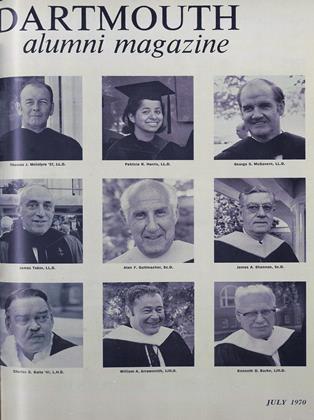As this is written, Dartmouth's heavyweight crew is in training at Henley-on- Thames, preparing for the Grand Challenge Cup encounter with the world's best oarsmen.
The trip to the Henley Royal Regatta is the final step - well, maybe - for the finest crew in Dartmouth history. Undefeated in cup racing this spring, the Indians followed their best showing in the Eastern Sprint championships by challenging Pennsylvania's heavies (who also are at Henley) in a trial heat at the IRA championships in Syracuse, N.Y., and then joining three other crews which finished ahead of the vaunted Quakers in the IRA final on June 13.
Penn has been the target for Coach Peter Gardner's oarsmen through this season. After the Sprints, he felt that the Indians could challenge Penn successfully if they were able to build their stroke rate.
This was accomplished and in the IRA trials, Dartmouth jumped to the early lead against the high-stroking Quakers and held the advantage through more than half of the 2000-meter race. Then Penn gradually fought back and won by one-third of a length, sending Dartmouth into a repechage race that saw the Green defeat Princeton to gain the final.
The championship race found Dartmouth doing what it had set out to accomplish - defeat Penn. The only problem was that Washington came out of the West with one of its finest crews to sweep to a convincing victory. Wisconsin, which had lost to Dartmouth in the Cochrane Cup regatta and at the Eastern Sprints, came on to finish second and the Indians were third.
What was even more surprising than Wisconsin's surge, however, was that Cornell took fourth place and vaunted Penn finished fifth ahead of Brown.
"Penn utilizes an unusually high stroke," said Gardner. (The Quakers have relied on a beat approaching 50 strokes per minute and a series of power drives in attempting to wear down their opposition). "In the trial, we withstood their drives through most of the race but they caught us at the end. In the final, they were unable to maintain the pace."
It would seem that Gardner has been aiming for this season as a peak in Dartmouth's rowing resurgence. Not so. Captain Steve Tourek from St. Paul, Minn., is the only senior in the boat that is competing at Henley and Gardner notes that there is a growing reservoir of oarsmen working as freshmen and in the junior varsity program.
Dartmouth sent a heavyweight crew to Henley in 1950 and had disappointing results. The Indian lightweights fared better in 1955 (winning two races) and this year's eight appears to be a still stronger entry. The trend doesn't appear likely to end.
After Henley, the Indians will train independently in Boston and then will enter the national championships in Philadelphia, a stepping stone to the world championships in September at St. Catharine's, Ontario.
 View Full Issue
View Full Issue
More From This Issue
-
 Feature
FeatureHYBRIS AND SOPHROSYNE
July 1970 By WILLIAM AYRES ARROW SMITH, LITT.D. '70 -
 Feature
FeatureDartmouth Undying
July 1970 By SHERMAN ADAMS '20 -
 Feature
FeatureDero A. Saunders '35 Elected President of Alumni Council
July 1970 -
 Feature
FeatureHONORARY DEGREE CITATIONS
July 1970 -
 Feature
FeatureReunions, 1970 Style
July 1970 By JAMES L. FARLEY '42 -
 Feature
FeatureFour Alumni Awards
July 1970
JACK DE GANGE
Article
-
 Article
ArticleSchedule for Dean Strong's Western Alumni Trip
December 1939 -
 Article
ArticleRequired Reading
JUNE 2000 -
 Article
ArticleBasketball
January 1955 By Cliff Jordan '45 -
 Article
ArticleReport from the Council
June 1987 By Mark Harty '73 -
 Article
ArticleNorth of Boston
February 1951 By Parker Merrow '25 -
 Article
ArticleThayer School
DECEMBER 1967 By Russ STEARNS '38







